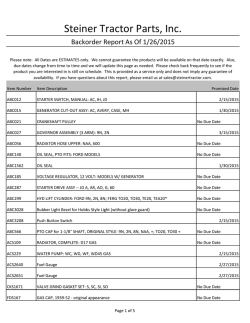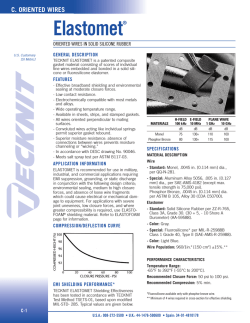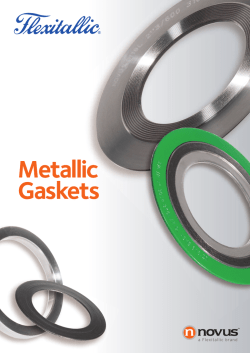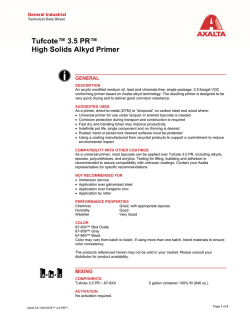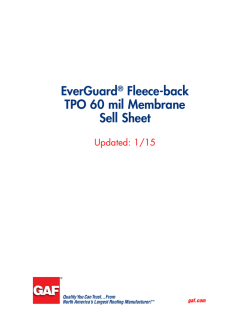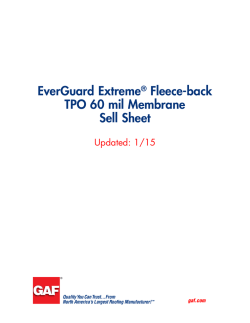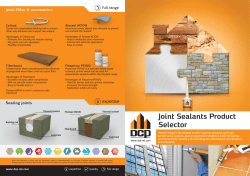
Gylon® Brochure - Garlock Sealing Technologies
Garlock GYLON® Products Family of PTFE gasketing Leaders in Sealing Integrity GYLON® : Family of PTFE gaskets GYLON® Family of PTFE gasketing GYLON® FAMILY HISTORY When PTFE* was developed in 1938, the importance of the material to industrial sealing was quickly recognized because of the tremendous chemical resistance characteristics. While use of PTFE as a gasket material increased in industrial applications, complaints about certain properties started to build: skive marks made initial sealing difficult, cold flow caused leakage and premature failure, and temperature/ pressure cycling was a problem. RESISTANCE TO COLD FLOW (CREEP) These drawbacks were eliminated when Garlock introduced Fawn GYLON®, Style 3500, in 1967. The GYLON® process minimizes creep and cold flow normally associated with PTFE products, while retaining other positive characteristics of PTFE. Fawn GYLON® was so innovative that it received Chemical Processing magazine’s Vaaler Award in 1968. As the variety and quantity of industrial chemicals increased, Garlock realized that new products would be required to serve the growing market. Two additional GYLON® styles were introduced to meet those demands: Blue GYLON® Style 3504, and Off-White GYLON® Style 3510. COMPRESSIBILITY As the diversity of applications grew, so did the types of piping systems. A large number of exotic piping systems were required to handle the many hazardous and corrosive chemicals on the market. A common drawback of these types of piping materials is the small amount of gasket load available before the flange is distorted or cracked. In 1989, Garlock responded to this problem by introducing ENVELON®, another member of the GYLON® family. ENVELON® has a soft material on the gasket / flange interface where compressibility is important, but has a slightly harder core in the middle to prevent media permeation and blowout. HIGH PRESSURE SERVICE, CHEMICAL COMPATIBILITY As production demands increased, pipe hammering and/or pressure spikes became more common. GYLON® Series HP 3560 and HP 3561 were designed to meet those extreme conditions. These perforated stainless steel-inserted GYLON® gasket materials outperform any other gasketing available for high pressure service where chemical compatibility is a concern. LOW BOLT LOAD SEALING In 1994, Garlock introduced GYLON® Style 3545 for low bolt load applications. It was designed specifically to seal pitted, warped or wavy flanges. Featuring soft, compressible outer layers and a rigid PTFE inner core, Style 3545 is ideal in situations where a rigid gasket is required, such as hard-toreach piping systems, valves and flanges. The layers of rigid PTFE and microcellular PTFE are sandwiched together using the proprietary GYLON® thermal bonding process, rather than adhesives, for longer gasket life. Style 3545 is so innovative, it received the 1995 Vaaler award from Chemical Processing magazine. UNLIMITED SIZES AND DIMENSIONS With growing concern over fugitive emissions, the traditional dovetailing method of creating larger sized gaskets no longer met many customer demands. In response, Garlock created the Welded GYLON® process. Welded GYLON® eliminated dovetail leak paths and allowed the use of large gaskets without handling problems or premature blowout. Today, GYLON® gaskets can be thermally bond (without the use of any adhesive or low melt temperature polymers) to any size or dimension; another breakthrough for Garlock gasketing. UNPARALLELED RELIABILITY AND SERVICE The Garlock family of GYLON® products has evolved over the years with a focus on quality to meet and exceed customer expectations. The use of Employee Involvement, Statistical Process Control, Vendor Assurance Programs, and a continuous improvement philosophy continues to guarantee end users the highest quality products available. Testing is performed regularly on all styles and thicknesses to ensure the consistency of Garlock quality in GYLON® sheets. Quality American-made products, 47 years of experience, on-time delivery and value-added service programs, all are reasons why the GYLON® family of products has become such a major sealing component in industry today. There is no doubt that demands will change in the future. But one thing is certain—Garlock will continue to answer those changes and demands with products that are innovative and timely. GYLON®, a name you can trust and a complete family of products to choose from for your gasketing needs. * PTFE – polytetrafluoroethylene Leaders in Sealing Integrity GYLON® : Family of PTFE gaskets GYLON® Gasketing TYPICAL PHYSICAL PROPERTIES* GYLON® STYLES Color 3500 3504 3504 3510 ® 3522 GYLON STYLES Fawn GYLON ® Blue GYLON ® Blue GYLON ® Off-white GYLON ® GYLON Color® Diaphragm Stress Saver Composition Temperature PTFE with silica Min. Cont. Max. Pressure psig. Cont. max (bar) P x T, Max. 1 psig x °F (bar x °C) Sealability barium sulfate -450°F -450°F -450°F (-268°C) (-268°C) (-268°C) 500°F (260°C) 500°F 500°F 500°F 500°F (260°C) (260°C) (260°C) (260°C) 1,200 800 800 1,200 (55) (55) (83) 350,000 350,000 (0.8mm, 1.6mm) (12,000) (12,000) (12,000) (12,000) 1/8” 250,000 250,000 250,000 250,000 (3.2mm) (8,600) (8,600) (8,600) (8,600) 0.22 0.12 -- 0.04 <0.015 <0.015 <0.015 <0.015 18 40 -- 11 7-12 25-45 12 4-10 Creep Relaxation % (ASTM F38) Range % (ASTM F36) % (ASTM F36) psi (ASTM D1708) (N/mm2) Temperature -450°F 350,000 ASTM Fuel A ml/hr PTFE Composition (-268°C) (83) (DIN 3535 Part 4) 4 Tensile Strength PTFE with microspheres 350,000 Gas Permeability cc/min. Recovery PTFE with glass microspheres 1/32”, 1/16” (ASTM F37B)3 Compressibility PTFE with glass >40 >30 >50 >40 2,000 2,000 2,000 2,000 (14) (14) (14) (14) Flammability Bacterial Growth Will not support flame Will not support Consult Engineering Pressure Based on ANSI RF flanges at our preferred torque. When approaching maximum pressure, temperature or 50% of maximum PxT, consult Garlock Engineering. For Styles HP 3560 and HP 3561, consult Garlock if approaching maximum temperature, or 50% of maximum pressure or P x T. 2 For 3565, HP 3560 and HP 3561, 1/16" thickness only; for 3535, 1/4" thickness only. 3 ASTM F37B Sealability, milliliters/hour (1/32" thick) ASTM Fuel A (isooctane): Gasket load = 1,000 psi (7 N/mm2), Internal pressure = 9.8 psig (0.7 bar) 4 DIN 3535 Part 4 Gas Permeability, cc/min. (1/16" thick) Nitrogen: Internal pressure = 580 psig (40 bar), Gasket load = 4,640 psi (32 N/mm2) Cont. Max. psig. Cont. max (b Consult P x T, Engineering Max.1 1/32”, 1/16” (0.8mm, 1.6 psig x °F (bar x °C) Sealability -- 1/8” (3.2mm) ASTM Fuel (ASTM F37B Gas Permeability cc/min. -- (DIN 3535 P Creep Relaxation % 35 Compressibility 20-25 Recovery >50 5,000 Tensile Strength (34) Flammability Bacterial Growth Notes: 1 Min. This is a general guide and should not be the sole means of selecting or rejecting this material. ASTM test results in accordance with ASTM F-104; properties based on 1/32" (0.8mm) sheet thickness, except Style 3565 and Style 3545 based on 1/16" (1.6mm). * Values do not constitute specification limits WARNING: Properties/applications shown throughout this brochure are typical. Your specific application should not be undertaken without independent study and evaluation for suitability. For specific application recommendations consult Garlock. Failure to select the proper sealing products could result in property damage and/or serious personal injury. Performance data published in this brochure has been developed from field testing, customer field reports and/or in-house testing. While the utmost care has been used in compiling this brochure, we assume no responsibility for errors. Specifications subject to change without notice. This edition cancels all previous issues. Subject to change without notice. GARLOCK is a registered trademark for packings, seals, gaskets, and other products of Garlock. Leaders in Sealing Integrity (ASTM F38) Range % (ASTM F36) % (ASTM F36) psi (ASTM D17 GYLON® : Family of PTFE gaskets 3540 White GYLON 3545 White GYLON ® Microcellular PTFE bar) ” 6mm) A ml/hr B)3 Part 4) 4 ) ) ) 708) (N/mm2) ® Microcellular PTFE 3560 3561 3565 Fawn metal inserted Off-white metal inserted ENVELON ® GYLON ® GYLON ® GYLON ® GYLON ® with perforated GYLON ® with perforated 316LSS insert 316LSS insert PTFE with glass -450°F -450°F --- --- -450°F (-268°C) (-268°C) --- --- (-268°C) 500°F 500°F 500°F 500°F 500°F (260°C) (260°C) (260°C) (260°C) (260°C) 1,200 1,200 2,500 2,500 2,500 (83) (83) (172) (172) (172) 350,000 350,000 700,000 700,000 350,000 (12,000) (12,000) (25,000) (25,000) (12,000) 250,000 250,000 450,000 450,000 250,000 (8,600) (8,600) (15,000) (15,000) (8,600) 0.25 0.15 0.2 2 0.12 0.332 <0.015 <0.015 <0.0152 <0.0152 <0.0152 10 15 20 2 20 2 352 70-85 60-70 4-9 2 3-72 35-50 2 >8 >15 >452 >50 2 >352 -- -- 5,000 2 5,000 2 1,800 2 -- -- (34) (13) (34) Will not support flame Will not support TEST DATA Before Compression at 2,000 psi (14 N/mm2) for 1 hour at 500°F (260°C) After Note the uneven cold flow shown by conventional PTFE. Style 3510 Off-White Style 3504 Blue Style 3500 Fawn Conventional PTFE For questions call gasket applications engineering at 1-315-597-4811 Leaders in Sealing Integrity GYLON® : Family of PTFE gaskets GYLON® Styles 3500 to 3510 BENEFITS Tighter Seal »» Improved performance over conventional PTFE »» Reduced product loss and emissions Reduced creep relaxation »» Unique manufacturing process minimizes cold flow problems typical of skived and expanded PTFE sheets »» Excellent bolt torque retention Chemical resistance »» Withstands a wide range of chemicals for extended service life in a wide variety of applications Cost savings »» Cuts operational costs through reduced: • Fluid loss • Inventory costs • Energy consumption • Waste • Maintenance costs Largest sheet sizes* »» Offers some of the largest sheet sizes in the industry »» Improved material utilization reduces waste Branding and color coding »» Easy identification of superior GYLON® products »» Reduces misapplication and use of unauthorized, inferior substitutes * 60” x 60” (1524 mm x 1524 mm), 70” x 70” (1778 mm x 1778 mm), 60” x 90” (1524 mm x 2286 mm) Media Thermally Bonded GYLON® BENEFITS Effective seal »» Patented bonding process produces large gaskets without dovetailed joints that permit leakage »» GYLON® material provides the excellent chemical resistance of PTFE without creep relaxation and cold flow problems Versatile »» Ideal for corrosive applications with extra-large flanges »» Styles 3500, 3504, 3510, 3540, HP 3560, HP 3561 and 3565 can all be thermally bonded using this process Style 3535 Joint Sealant BENEFITS Chemical resistance »» Pure PTFE is chemically inert, withstands a wide range of chemicals »» Conforms to FDA regulations GYLON® 3500: Strong acids (except hydrofluoric), solvents, hydrocarbons, water, steam, chlorine, and cryogenics. Conforms to FDA regulations. (For oxygen service, specify "Style 3502 for oxygen service.") Easy to install »» Continuous length on spools is easily cut and formed »» Strong adhesive backing aids installation on narrow or hard-toreach flanges »» Available in widths from 1/8” to 1” GYLON® 3504: Moderate concentrations of acids and some caustics, hydrocarbons, solvents, water, refrigerants, and cryogenics. Conforms to FDA regulations. (For oxygen service, or NSF-61 potable water service specify "Style 3505 for oxygen service.") Typical Physical Properties GYLON® 3504: STRESS SAVER Moderate concentrations of acids, caustics, solvents, refrigerants, cryogenics, hydrocarbons and hydrogen peroxide. Conforms to FDA regulations and USP Class VI (US Pharmacopeia), Specify 3505 for NSF 61 (National Sanitation Foundation) potable water service. GYLON® 3510: Strong caustics, moderate acids, chlorine, gases, water, steam, hydrocarbons, and cryogenics. Conforms to FDA regulations. (For oxygen service, specify "Style 3503 for oxygen service.") Sealability (ASTM F37B)1 ml/hr Gas Permeability (DIN 3535 Part 4) cc/min. Temperature -450°F (-268°C) to 500°F (260°C) Pressure 800 psig max. 0.1 2 0.05 Notes: 1 ASTM F37B Sealability, milliliters/hour (1/4" thick) ASTM Fuel A (isooctane): Gasket load: 3,000 psi (20.7 N/mm2), Internal pressure: 30 psig (2 bar) 2 DIN 3535 Part 4 Gas Permeability, cc/min. (1/4" thick) Nitrogen: Internal pressure: 580 psig (40 bar), Gasket load: 4,640 psi (32 N/mm2) Leaders in Sealing Integrity GYLON® : Family of PTFE gaskets GYLON® Style 3545 CONFIGURATION BENEFITS Tighter seal »» Highly compressible PTFE outer layers seal under low bolt load— suitable for many flat face and glass-lined flanges* »» Compressible layers conform to surface irregularities, especially on warped, pitted or scratched flanges »» Rigid PTFE core reduces cold flow and creep normally associated with conventional PTFE gaskets Microcellular PTFE Rigid PTFE Excellent chemical compatibility »» Pure PTFE withstands a wide range of chemicals Easy to cut and install »» Soft PTFE can be cut easily from larger sheets, reducing inventory costs and expensive downtime »» Rigid PTFE core facilitates installation, especially on large diameter flanges and hard-to-reach areas GYLON Style 3540 ® »» Pure microcellular PTFE »» Similar to Style 3545, but without rigid core »» Ideal for wavy, warped, pitted, or scratched flanges, and for many types of flat face flanges* Test Results DIN 3535 Gasket Permeation Test Microcellular PTFE Cross-sectional view under electron microscope. All layers manufactured using proprietary GYLON® process thermally fused layers, without the use of adhesives. Media GYLON® 3540: Strong caustics, strong acids, hydrocarbons, chlorine, and cryogenics. Conforms to FDA regulations. GYLON® 3545: Strong caustics, strong acids, hydrocarbons, chlorine, cryogenics and glass-lined equipment. Conforms to FDA regulations. DIN 52913 Gasket Bolt Load vs. Time Bolt Load Retained – psi (bar) 0.16 Leak Rate (cc/min.) 0.14 0.12 0.10 0.08 0.06 0.04 0.02 0 ExpandedGYLON®GYLON® PTFE 3540 3545 Note the dramatically reduced leakage of GYLON® 3540 and 3545. Average of three tests, using 580 psig nitrogen with 4,640 psi gasket load according to DIN 3535 requirements. All samples 1/16" (1.6 mm) thick. 7500 (53.5) 6000 (42) 4500 (31.5) 3000 (21) 1500 (10.5) 0 0 2 4 6 8 1012 1416 Hours at 500°F (260°C) GYLON® 3540 Expanded PTFE GYLON® 3545 Skived PTFE High bolt load retention of GYLON 3540 and 3545, especially at high temperatures, indicates gasket is less likely to incur gross leakage (blowout). ® * For flat face flanges, a minimum compressive stress of 1,500 psi (103 N/mm2) is recommended on the contacted gasket area for 150 psig (10.3 N/mm2) liquid service. Consult with the flange manufacturer to confirm that adequate compressive stress is available. Leaders in Sealing Integrity GYLON® : Family of PTFE gaskets GYLON® Styles HP 3560 / HP 3561 BENEFITS Tight seal »» Perforated stainless steel core increases resistance to pressure fluctuations and thermal cycling »» GYLON® offers superior cold flow and creep resistance, eliminating the need for frequent retorquing Chemical resistance »» Seals aggressive chemicals in hostile environments where safety or blowout resistance is crucial* GYLON® Style 3565 ENVELON® Gasketing BENEFITS Tighter seal »» Soft, deformable exterior conforms to surface irregularities; ideal for worn, warped or pitted flanges »» Stable blue core improves cold flow resistance »» Low bolt load requirements ensure a tight seal on glass-lined or wavy flanges † »» Direct sintering of GYLON® layers prevents leak paths and adhesive contamination Media HP 3560: Strong acids (except hydrofluoric), solvents, hydrocarbons, water, steam, chlorine, and cryogenics (For oxygen service, specify “HP 3562 for oxygen service.”) HP 3561: Strong caustics, moderate acids, chlorine, gases, water, steam, hydrocarbons, and cryogenic (For oxygen service, specify “HP 3563 for oxygen service.”) Style 3565: ENVELON® Moderate concentrations of acids and caustics, hydrocarbons, solvents, cryogenics, and glass-lined equipment. Conforms to FDA regulations. WARNING: Properties/applications shown throughout this brochure are typical. Your specific application should not be undertaken without independent study and evaluation for suitability. For specific application recommendations consult Garlock. Failure to select the proper sealing products could result in property damage and/or serious personal injury. Performance data published in this brochure has been developed from field testing, customer field reports and/or in-house testing. While the utmost care has been used in compiling this brochure, we assume no responsibility for errors. Specifications subject to change without notice. This edition cancels all previous issues. Subject to change without notice. GARLOCK is a registered trademark for packings, seals, gaskets, and other products of Garlock. Easy to install »» Unitized construction avoids jacket fold over »» Rigid core facilitates installation of large gaskets Minimizes inventory »» Custom-cut gaskets from large sheets offer convenience while reducing costly inventory buildup »» Ideal replacement for slit, milled, formed shield and double jacketed envelope gaskets † * Consult Garlock Applications Engineering when using flanges in pressure classes above 300 lbs. ** Patents #4,961,891; #4,900,629 † When sealing uneven flanges, gasket must be four times thicker than maximum gap between flanges. For questions call gasket applications engineering at 1-315-597-4811 Leaders in Sealing Integrity GYLON® : Family of PTFE gaskets BEFORE INSTALLATION »» Remove old gasket, and clean flange surface of all debris. For best results, use a metal flange scraper, an aerosol gasket remover and a wire brush, then inspect the flange for damage. Be sure surface finish and flatness are satisfactory. »» Use the thinnest possible gasket. However, flanges that are warped, bowed or severely pitted require thicker gaskets. »» Whenever possible, use ring gaskets. Full face gaskets have more surface area, requiring additional compressive load on the gasket. »» Never use metal-based anti-seize on gaskets, since particles may accumulate in the surface imperfections, thereby creating a flange surface that is too smooth to be effective. Such coatings will also greatly impair the resistance of the gasket pressure. INSTALLATION »» Center the gasket on the flange. This is extremely vital where raised faces are involved. Note: Standard ANSI ring gaskets, when properly cut, should center themselves when the bolts are in place. »» Use a torque wrench and well-lubricated fasteners with hardened flat washers to ensure correct initial loading. »» Tighten bolts to compress gasket uniformly. This means going from side to side around the joint in a star-like crossing pattern. See Figure 3 below. »» All bolts should be tightened in one-third increments, according to proper bolting patterns. »» Retorque 12 to 24 hours after start-up, whenever possible. All applicable safety standards including lockout/tagout procedure should be observed. »» Never use liquid or metallic based anti-stick or lubricating compounds on the gaskets. Premature failure could occur as a result. Figure 3: Correct Bolting Patterns 8 1 3 3 2 2 3 3 4 4 2 2 4 4 1 1 6 967 9 7 Circular Circular Four-Bolt Four-Bolt “M” - Maintenance Factor A factor that provides the additional preload needed in the flange fasteners to maintain the compressive load on a gasket after internal pressure is applied to a joint. The net operating stress on a pressurized gasket should be at least (m) x (design pressure, psi). “Y” - Minimum Design Seating Stress The minimum compressive stress in pounds per square inch (or bar) on the contact area of the gasket that is required to provide a seal at an internal pressure of 2 psig (0.14 bar). Style Thickness M Y (psi) 3500 1/16” 1/8” 5.0 5.0 2,750 3,500 3504 1/16” 1/8” 3/16” 1/4” 3.0 2.5 2.5 2.5 1,650 3,000 3,000 3,000 3510 1/16” 1/8” 2.0 2.0 2,350 2,500 3535 1/4” 2.0 3,000 3540 1/16” 1/8” 3/16” 1/4” 3.0 3.0 2.0 3.0 1,700 2,200 2,200 2,500 3545 1/16” 1/8” 3/16” 1/4” 1/8” 2.6 2.0 2.0 7.0 2.0 1,500 2,200 2,200 3,700 800 HP 3560 1/16” 1/8” 5.0 5.0 3,500 4,000 HP 3561 1/16” 1/8” 5.0 5.0 3,500 4,000 3565 1/16” 1/8” 3/16” 1/4” 2.8 3.7 5.5 6.0 1,400 2,300 2,800 2,800 (in envelope) 10 10 85 5 1 “M” AND “Y” DATA “M” and “Y” data are to be used for flange designs only as specified in the ASME Boiler and Pressure Vessel Code Division 1, Section VIII, Appendix 2. They are not meant to be used as gasket seating stress values in actual service. Our bolt torque tables give that information and should be used as such. 1 1 3 3 4 4 2 2 Square Noncircular Noncircular Square Four-Bolt Four-Bolt Multibolt Multibolt 9 9 4 14 4 14 7 12 12 7 5 2 1 6 1 15 15 16 16 2 6 5 11 11 8 8 3 3 10 13 10 13 Circular Circular Multibolt Multibolt Leaders in Sealing Integrity GYLON® : Family of PTFE gaskets Gasket Constants Style 3500 3504 3510 Thickness Gb a Gs S100 S1000 S3000 S5000 S10000 Tpmin Tpmax 1/16” 949 0.253 2.60E+00 3,043 5,448 7,194 8,187 1/8” 1980 0.169 3.93E-01 4,313 6,365 7,663 8,354 9,756 373 16,890 9,393 223 25,375 1/16” 183 0.357 4.01E-03 947 2,155 3,190 3,828 4,903 3,097 14,817 1/8” 1008 0.221 2.23E+00 2,793 4,649 5,928 6,638 7,739 141 72,992 1/16” 289 0.274 6.61E-11 1,021 1,918 2,592 2,981 3,605 11,881 25,501 1/8” 444 0.332 1.29E-02 2,048 4,399 6,336 7,507 9,449 1,770 17,550 3535 3/8” 430 0.286 1.69E-09 1,605 3,101 4,245 4,913 5,991 373 3540 1/16” 550 0.304 7.64E-01 2,230 4,491 6,272 7,326 9,044 973 3545 1/16” 162.1 0.379 1.35E-09 927 2,217 3,361 4,079 5,303 18,209 61,985 1/8” 92.48 0.468 2.50E-03 799 2,349 3,930 4,992 6,907 4,460 53,307 3/16” 628 0.249 7.93E-05 1.977 3,507 4,611 5,236 6,222 373 1/16” 72.3 0.466 2.16E-01 618 1,808 3,016 3,827 5,286 1,688 3561 Gb = stress at which seal is initiated; "a" = the slope of the log/log tightness curve; Gs = intersection of the unload curve with the vertical axis (Tp1). 23,670 21,755 Note: For a 5" OD gasket at 800 psig, Tp100 = 102ml / min. leakage, Tp1,000 = 1.02ml / min. leakage, Tp10,000 = 0.01 ml / min. leakage. Sheet Sizes 60” x 60” 70” x 70” Style 1/31” 1/16” 1/8” 3/16” 1/4” 3500 • • • • • • • 3540 3545 HP 3560 • • HP 3561 • • 3565 • 1/8” • • • • • • • • • • • • • • • • • • • • • • • 1/16” 1/8” • • • • • • • • • • • • • • • • • 1/4” • • 1/32” • 1/32” 1/16” 24” x 24” 1/8” 3510 1/16” 40” x 40” 1/16” 3504 1/32” 60” x 90” 1/8” • • Leaders in Sealing Integrity GSK 3:3 GARLOCK an EnPro Industries family of companies Tel: 1-877-GARLOCK / 315.597.4811 Fax: 800.543.0598 / 315.597.3216 www.garlock.com Garlock Sealing Technologies Garlock Rubber Technologies GPT Garlock PTY Garlock do Brasil Garlock de Canada, LTD Garlock China Garlock Singapore Garlock Germany Garlock India Private Limited | Rev K Garlock de Mexico, S.A. De C.V. Garlock New Zealand Garlock Great Britain Limited Garlock Middle East
© Copyright 2026
